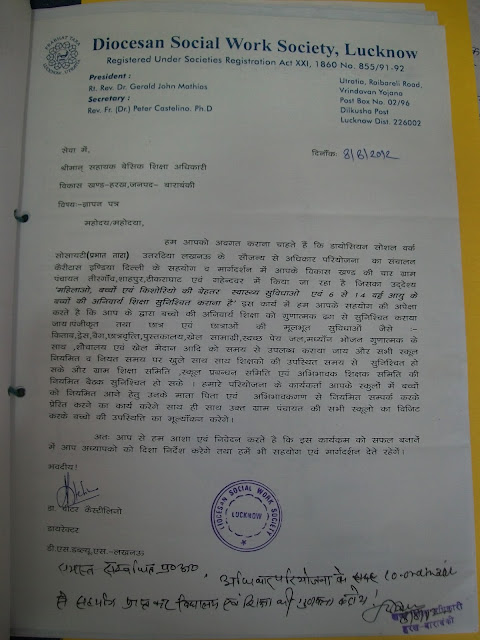 Review meeting is a platform
for cross learning and strategy formulation to overcome challenges through
collective reflection and decide upon way forward. Caritas India had conducted
a review cum planning workshop on 10-11th December 2012 at RCDSS,
Ajmer in which 11 ADHIKAR partners and 3 IDEA partners from Delhi, UKSVK and
Bihar regions took part in the meeting. It was an amalgamation of sharing of
work with special emphasis on Result Based Management, brainstorming and input
sessions. Moreover, partners could strategise programmes in accordance with objective
utilization of available resources for availing optimum outcomes under IDEA and
ADHIKAR project.
Review meeting is a platform
for cross learning and strategy formulation to overcome challenges through
collective reflection and decide upon way forward. Caritas India had conducted
a review cum planning workshop on 10-11th December 2012 at RCDSS,
Ajmer in which 11 ADHIKAR partners and 3 IDEA partners from Delhi, UKSVK and
Bihar regions took part in the meeting. It was an amalgamation of sharing of
work with special emphasis on Result Based Management, brainstorming and input
sessions. Moreover, partners could strategise programmes in accordance with objective
utilization of available resources for availing optimum outcomes under IDEA and
ADHIKAR project.
Rev. Fr. Cyril,
Executive Director of UKSVK region addressed the gathering with sharing inspirational
thoughts quoted from Catholic Social Teachings on commitment and dedication of
staff in providing qualitative services which will bring improved changes in
the lives of the poor and the marginalised. Rev. Fr. Amal Raj, Executive
Director of Bihar Forum made a deliberation on recent advancement of ADHIKAR
programme and its effort to realize various entitlements for marginalized under
right to work and right to food. Mr. PU Francis, Zonal
Manager-North Zone enlightened the participants on Micro planning which
includes process, people’s participation, identifying issues etc. It was
suggested that all partners should take concerted effort to mobilize community
in obtaining their due entitlements through participate in Grama Sabha. Mr.
Ashok Sinha, Consultant oriented the participants on Right to Education Act and
its provisions.
Mr. Arun Kumawat, MNREGA practitioner associate with an NGO from
Chittorgarh gave input session on MGNREGA. He highlighted the origin
of MGNREGA Act and its features and present situation of the MGNREGA work in
Northern region. He felt that the success of the MGNREGA program is
connected with the awareness creation among the people in rural villages. He
advised the group to motivate the villagers to put in writing their demand
for work in their area. The Zonal Manager along with Zonal team facilitated the group
presentations and entire two days program. The
participants expressed their satisfaction over the two days program as the
review provided an opportunity for mutual learning that helped them to intensify
their understanding on various rights, concerned legislations and its
application.
In a brainstorming session, coordinators identified major challenges foresee
and prepared strategies to combat the same in the near future. The
diocesan directors designed an action plan for capacitating staff as well as Community
Based Organizations, better implementation and accompaniment of ADHIKAR program
& Liasioning with Govt. officials and to facilitate the Micro planning in Grama
Sabha meetings.















